Preserving Dignity Through Proper Refrigeration
Morgue refrigeration solutions are specialized cooling systems designed to preserve human remains by slowing decomposition. Here's what you need to know:
| Key Aspects | Details |
|---|---|
| Temperature Range | Standard: 35.6°F-39.2°F (2°C-4°C) Forensic/Long-term: -10°C to -50°C |
| Main Types | Body box (2-23 capacity), Walk-in (4-50+ capacity), Portable/Emergency |
| Essential Features | Stainless steel construction, 4" polyurethane insulation, Digital temperature controls, OSHA-compliant safety handles |
| Storage Duration | Several weeks in standard refrigeration, months to years in negative temperature units |
| Cost Considerations | $5,000+ for basic units, with customization and capacity affecting price |
When a loved one passes away, providing dignified care becomes paramount. Morgue refrigeration solutions play a critical role in this process by maintaining the integrity of human remains until final arrangements can be made. Without proper refrigeration, decomposition begins within hours, compromising both the appearance of the deceased and creating potential health hazards.
Modern morgue refrigeration systems do more than simply cool—they create controlled environments that preserve dignity while meeting strict health regulations. These specialized units maintain precise temperatures that significantly slow bacterial growth and enzymatic breakdown of tissues.
I'm Mortuary Cooler, a national-level supplier of morgue refrigeration solutions with extensive experience delivering customized cooling systems to funeral homes, medical facilities, and forensic laboratories across the United States. My expertise in morgue refrigeration solutions has helped countless facilities maintain dignified, efficient operations even during surge capacity needs.
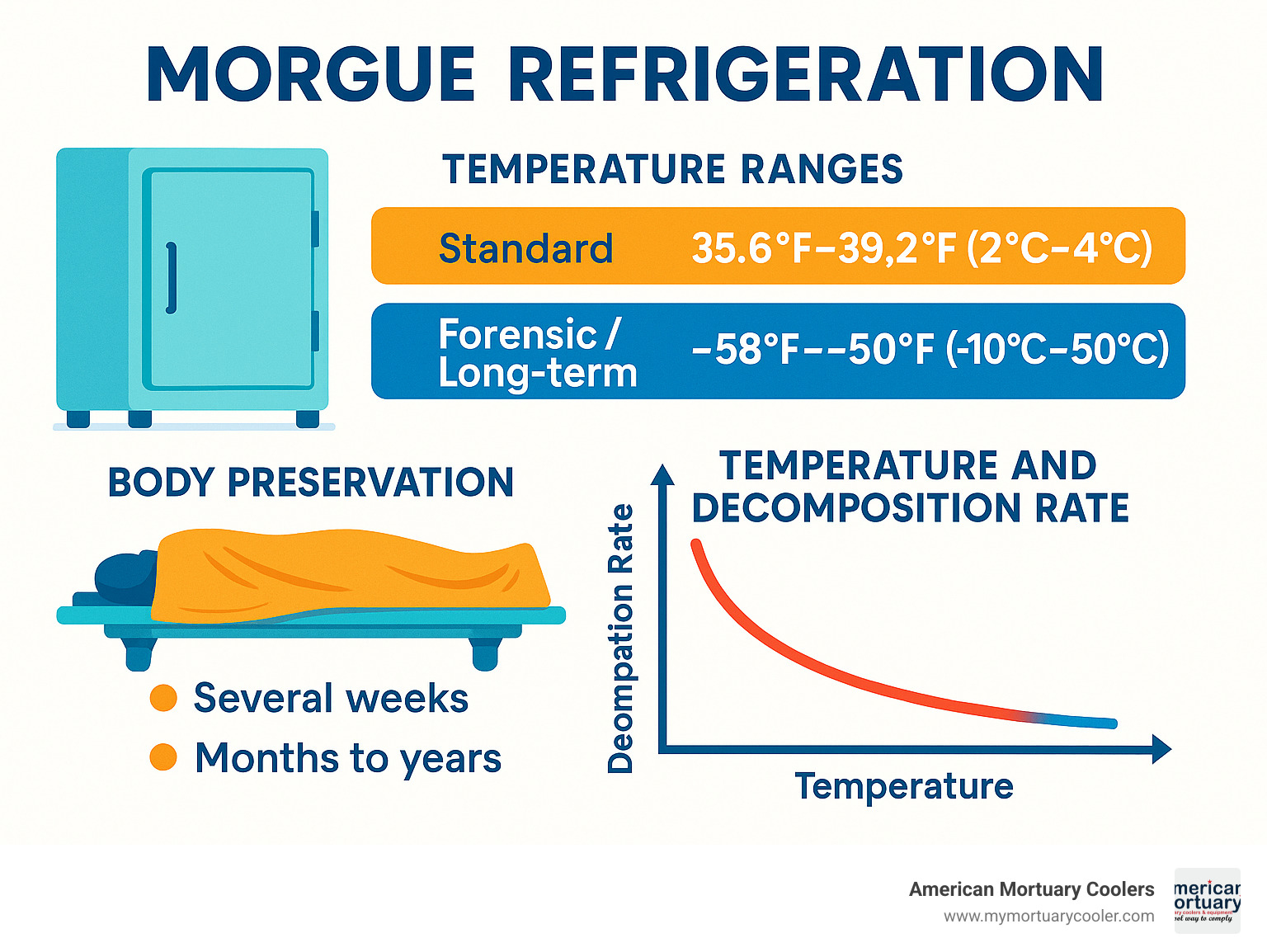
Know your morgue-refrigeration-solution terms:
Why This Guide Matters
The COVID-19 pandemic taught the funeral industry a harsh lesson about preparedness. Many facilities found themselves overwhelmed with limited refrigeration capacity during surge periods. According to industry data, funeral homes that had invested in scalable morgue refrigeration solutions were better equipped to maintain dignity and service quality even during unprecedented demand.
"The pandemic revealed a critical gap in many facilities' infrastructure," notes our lead refrigeration specialist at American Mortuary Coolers. "Those with flexible, expandable refrigeration systems were able to maintain respectful care while those without struggled with overflow conditions."
Proper facility planning now includes contingency refrigeration capacity—whether through modular systems that can expand or through relationships with portable refrigeration providers. This guide will help you understand all aspects of morgue refrigeration solutions to make informed decisions for your facility's current and future needs.
What Is Morgue Refrigeration & Why It Matters
When we talk about morgue-refrigeration-solutions, we're discussing specialized cooling systems that go far beyond your kitchen refrigerator. These systems are thoughtfully designed with the solemn purpose of preserving human remains with dignity and care.
Think of morgue refrigeration as the quiet guardian of both dignity and public health. When a loved one passes, these systems create a peaceful pause in nature's processes, giving families the precious gift of time to gather, grieve, and make arrangements without urgency.
"I've seen how proper refrigeration provides families with comfort during their darkest hours," shares one of our longtime funeral director clients in Nashville. "Knowing their loved one is being cared for properly gives them space to process their grief."
At its heart, morgue-refrigeration-solutions serve several vital purposes. They maintain the physical integrity of the deceased, allowing for more meaningful viewings and ceremonies. They protect public health by preventing the growth of pathogens that naturally occur during decomposition. For medical examiners and forensic specialists, proper refrigeration preserves crucial evidence. And for all facilities, these systems ensure compliance with OSHA, NSF, and local health department standards.
The Science Behind Preservation
Understanding what happens after death helps explain why morgue-refrigeration-solutions are absolutely essential. The human body is remarkable even after life has ended, but without intervention, natural processes begin immediately.
After death, the body's own bacteria—normally kept in check by our immune system—begin multiplying rapidly. Meanwhile, enzymes that once supported life start breaking down tissues in a process called autolysis. These processes accelerate dramatically at room temperature, but proper refrigeration changes everything.
At temperatures between 35.6°F and 39.2°F (2°C to 4°C), nature's clock nearly stops. Bacterial growth slows to a crawl, and enzymatic reactions virtually halt. This temperature sweet spot transforms what would be hours of preservation at room temperature into weeks of dignified care.
Humidity plays a surprisingly important role too. Too much moisture can accelerate certain decomposition processes, while too little causes dehydration and unwanted tissue changes. That's why our morgue-refrigeration-solutions at American Mortuary Coolers maintain optimal humidity levels, typically between 85-95%, striking the perfect balance for preservation.
Temperature control also influences rigor mortis—the natural stiffening of muscles after death. Proper refrigeration can help manage this process, which has important implications for body positioning and preparation for viewing.
Even cooling throughout the body matters tremendously. Larger individuals naturally take longer to cool completely, which is why professional morgue-refrigeration-solutions incorporate powerful cooling systems with carefully engineered air circulation to ensure consistent temperatures throughout.
For those serving families during their most vulnerable moments, having reliable refrigeration isn't just about compliance or convenience—it's about creating the foundation for compassionate, dignified care when it matters most.
Core Types of Morgue Refrigeration Solutions
When it comes to preserving human remains with dignity, the type of morgue-refrigeration-solution you choose matters tremendously. At American Mortuary Coolers, we've seen how the right equipment makes all the difference for funeral homes, hospitals, and medical examiner offices across the country.
Body Box Refrigeration
Body boxes are the workhorses of many smaller facilities. Think of them as specialized standalone units that offer reliability without requiring dedicated room space.
One Tennessee funeral director told me, "Our 3-body refrigerator gives us the perfect buffer capacity for weekend services without requiring a full walk-in installation." That's exactly what these units deliver - practical solutions for everyday needs.
These units typically hold between 2 and 23 bodies depending on the configuration. You'll find them available in 2-tier, 3-tier, and even 4-tier designs to maximize vertical space. Whether you need front-loading, side-loading, or roll-in access depends entirely on your workflow and space constraints.
What makes these units special is their purpose-built design - with digital temperature controls, alarm systems, and durable stainless steel construction that stands up to daily use while maintaining proper sanitation standards.
Walk-In Refrigeration
For larger operations, nothing beats the flexibility of a walk-in cooler. These modular systems truly shine when volume and adaptability are priorities.
"Our walk-in unit from American Mortuary Coolers completely transformed our workflow," a Chicago-area medical examiner recently shared with us. "The adjustable rack system allows us to accommodate varying case loads efficiently, and the modular design means we can expand in the future."
Walk-in units feature 4-inch thick insulated panels that can be configured to fit almost any space. They accommodate anywhere from 5 to 50+ bodies depending on the design, and the modular nature means they can grow with your facility. Many funeral directors appreciate that these systems can be disassembled and relocated if their business moves to a new location.
Portable and Emergency Solutions
If the pandemic taught our industry anything, it's the value of surge capacity. Portable morgue-refrigeration-solution options have evolved significantly in recent years.
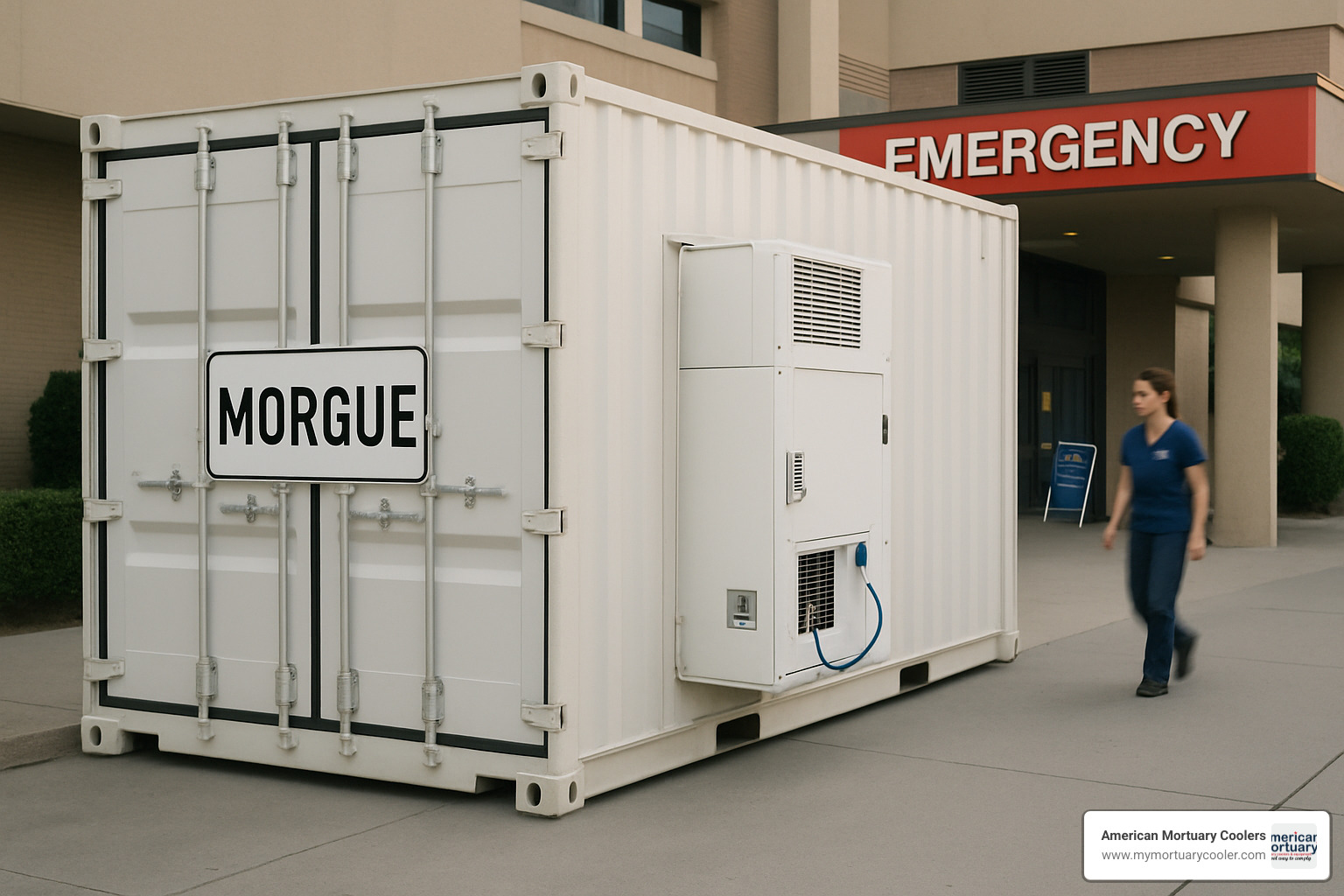
These systems include rapid-deploy coolers that can be operational within hours, container-based solutions for large-scale needs, and innovative approaches like the MERC System® which uses liquid cooling technology. Some facilities have even implemented CoolBot DIY solutions that modify standard air conditioners for temporary morgue use. Rental options also exist for truly temporary situations.
Specialized Options
The funeral industry's needs are as diverse as the communities we serve, which is why specialized morgue-refrigeration-solution options have become increasingly important.
Bariatric units feature wider compartments and reinforced trays to accommodate larger individuals with dignity. Dual-temperature systems combine standard refrigeration with freezer compartments in a single unit, offering versatility for different preservation needs.
For busy facilities, pass-through designs allow access from two sides for improved workflow efficiency. Combination units provide both roll-in capability and individual compartment access, giving you the best of both worlds.
morgue-refrigeration-solution Spectrum
The full range of refrigeration options can be understood by considering the intended preservation timeframe:
Short-Term Coolers (35.6°F-39.2°F / 2°C-4°C)
These standard units are the backbone of funeral homes and hospital morgues. They're designed to preserve remains for viewing and services, typically maintaining bodies for up to several weeks while focusing on appearance preservation and dignity.
Long-Term Freezers (-10°C to -50°C)
Found primarily in forensic settings, research facilities, and disaster response operations, these units can preserve remains for months or even years by halting decomposition almost completely. They require specialized thawing procedures before viewing.
Mobile Trailers and Containers
When emergencies strike, these deployable units become essential. They range from small portable units to full-sized refrigerated trailers, often used by emergency management agencies and military operations.
"The key is matching the solution to your specific needs," as our cooling specialist at American Mortuary Coolers often reminds clients. "We've designed systems for everything from small rural funeral homes to major metropolitan medical examiners' offices, each with unique requirements."
Whether you're planning a new facility or upgrading existing equipment, understanding these core options helps ensure you select the morgue-refrigeration-solution that will best serve your community with dignity and efficiency.
Positive vs. Negative Temperature Morgue Refrigeration
When it comes to morgue refrigeration solutions, one of the most important decisions facilities face is choosing between positive and negative temperature systems. This choice affects everything from preservation quality to operating costs.
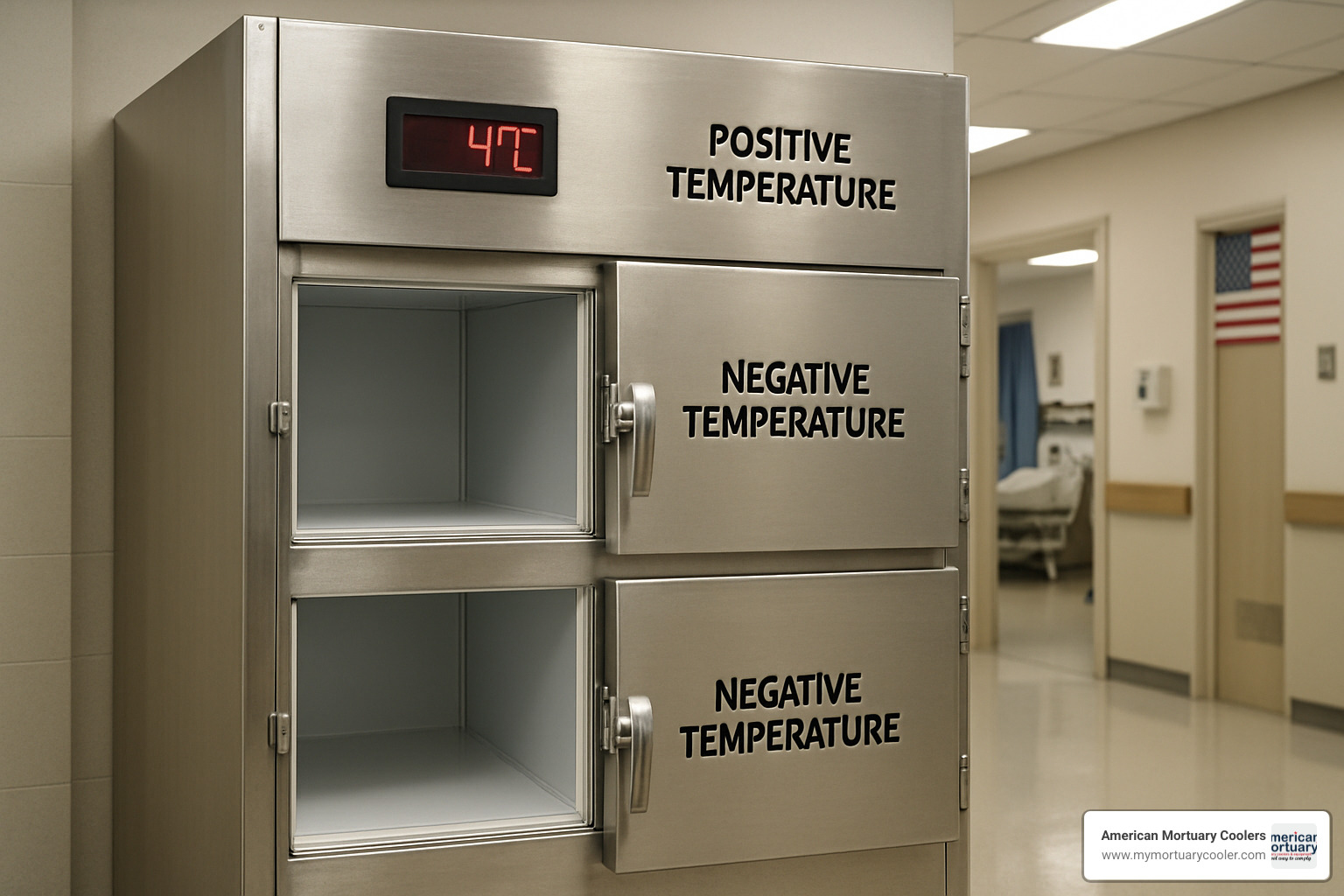
Positive Temperature Systems (2°C to 4°C / 35.6°F to 39.2°F)
Think of positive temperature refrigeration as nature's pause button. These systems maintain temperatures just above freezing, creating the perfect environment to slow decomposition while preserving the natural appearance of the deceased.
"Positive temperature units give us the breathing room families need," explains a funeral director from our Dallas service area. "They provide that crucial window of time for loved ones to gather and for our staff to prepare the deceased with dignity—all without significantly altering the body's condition."
These systems strike an ideal balance between preservation and practicality. They consume less energy than their freezer counterparts while maintaining the body in a condition that closely resembles its natural state. This makes them the go-to choice for most funeral homes and hospital morgues where viewing and preparation are primary concerns.
The gentle cooling action slows bacterial growth and enzymatic processes without the tissue changes that freezing can cause. For families planning viewings or open-casket services, this preservation approach maintains the most natural appearance and makes the embalmer's work more straightforward.
Negative Temperature Systems (-10°C to -50°C / 14°F to -58°F)
Our refrigeration specialist at American Mortuary Coolers likes to call negative temperature units "the cold-hearted heroes of long-term storage," and for good reason. These powerful freezer systems essentially press the stop button on decomposition by maintaining temperatures well below freezing.
Operating between -10°C and -50°C (14°F to -58°F), these systems create an environment where biological processes virtually halt. This makes them invaluable for situations where extended preservation is necessary—sometimes for months or even years.
While they require more energy and typically cost more to operate, negative temperature morgue refrigeration solutions play an essential role in forensic work, disaster response, and situations where final arrangements face significant delays. The trade-off for this superior preservation is that freezing can cause tissue changes that may complicate later preparation for viewing.
Positive Temperature Applications
You'll find positive temperature systems in settings where shorter-term care and viewing preparation are priorities:
Hospital morgues rely on these systems to maintain remains while families make decisions or arrangements for transfer. Funeral homes use them as their standard cooling solution when preparing for services that will occur within days or weeks. Medical examiner offices often use them for short-term identification needs, and many facilities keep them on hand for temporary holding during busy periods.
The beauty of these systems lies in their balance of functionality and gentleness. They preserve dignity by maintaining a natural appearance while giving families the time they need to gather and make arrangements.
Negative Temperature Applications
Negative temperature systems shine in specialized settings where long-term preservation is critical:
Forensic laboratories depend on freezer systems to preserve evidence exactly as it was found—a necessity for criminal investigations that may stretch on for months or years. During mass casualty events, disaster victim identification operations often rely on freezer units to preserve remains until proper identification can occur. Research facilities studying decomposition or anatomy also benefit from the extended preservation these systems provide.
"In forensic work, negative temperature storage isn't optional—it's essential," notes a medical examiner from our New York service area. "When evidence preservation could make or break a case, we need the most reliable freezing technology available."
A question we frequently hear is: do refrigerated bodies at hospital morgues smell bad? The truth is that properly maintained morgue refrigeration solutions dramatically reduce odors by preventing bacterial growth. The sealed environment and precise temperature control create conditions where decomposition odors are minimized. Of course, regular cleaning and maintenance remain essential for both sanitation and odor control—something we emphasize with all our clients.
Whether your facility needs the gentle preservation of positive temperature systems or the long-term security of negative temperature units, American Mortuary Coolers can design a solution custom to your specific requirements and space constraints.
Design & Key Features of a High-Quality morgue-refrigeration-solution
When it comes to preserving the dignity of the deceased, not all refrigeration is created equal. The design and construction of a morgue refrigeration solution directly impacts its effectiveness, longevity, and the respect it provides to those in your care.
Materials and Construction
The foundation of any quality morgue refrigeration solution starts with the right materials. Type 304 stainless steel has become the gold standard for both interior and exterior surfaces, offering remarkable resistance to corrosion while being incredibly easy to sanitize. This is paired with high-density polyurethane insulation, typically 4 inches thick, creating a thermal barrier that maintains stable temperatures while keeping energy costs manageable.
"I learned the hard way that cutting corners on materials is penny-wise but pound-foolish," shares a facility manager from our Columbia, SC service area. "The difference between economy units and professional-grade morgue refrigeration solutions becomes evident within a few years. The investment in quality materials pays dividends in longevity and performance."
Quality units also feature seamless interior construction, eliminating crevices where fluids might collect and bacteria could flourish. The reinforced flooring is engineered to support not just the weight of human remains but also the transport equipment used to move them, preventing sagging or damage over time.
Temperature Control & Monitoring
The heart of any morgue refrigeration solution is its temperature management system. Today's advanced units employ PID (Proportional-Integral-Derivative) controllers that continuously adjust cooling output, maintaining temperatures with precision that older on/off systems simply can't match.
Remote monitoring capabilities have revolutionized facility management, allowing staff to receive immediate alerts about temperature fluctuations directly on their smartphones. This technology provides peace of mind, especially during weekends and holidays.
"The remote monitoring capability has been a game-changer for our weekend operations," explains one of our Pittsburgh customers. "We can verify proper functioning without sending staff to the facility, which has saved us countless unnecessary trips."
Many critical installations now feature redundant cooling systems with backup compressors that activate automatically if the primary system fails. Coupled with forced air circulation that prevents temperature stratification, these features ensure consistent preservation throughout the storage area.
For a deeper dive into temperature specifications for different applications, our guide to morgue cooler temperatures provides comprehensive information.
Construction for Hygiene & Durability
The unique challenges of storing human remains demand specialized construction techniques. Seam-welded interiors eliminate hiding places for contaminants, while cam-lock panel systems create tight-sealing joints in modular walk-in units. Coved corner construction replaces sharp angles with gentle curves, making thorough cleaning significantly easier.
Many facilities now opt for antimicrobial surface treatments like SmartProtec®, which actively reduce bacterial populations on contact surfaces. Strategic floor drains allow for thorough washing of interior surfaces without pooling.
"In 20 years of operation, our American Mortuary Coolers unit has required minimal maintenance," a long-time customer from our Southeast Region proudly tells us. "The quality of construction has proven its value many times over, and the unit still looks almost new inside despite daily use."
Safety & Compliance
Beyond performance, morgue refrigeration solutions must meet stringent safety and regulatory standards. UL listing ensures electrical components meet safety requirements, while NSF certification verifies that materials and construction satisfy sanitation standards. OSHA compliance includes essential safety features like interior release handles that prevent accidental entrapment.
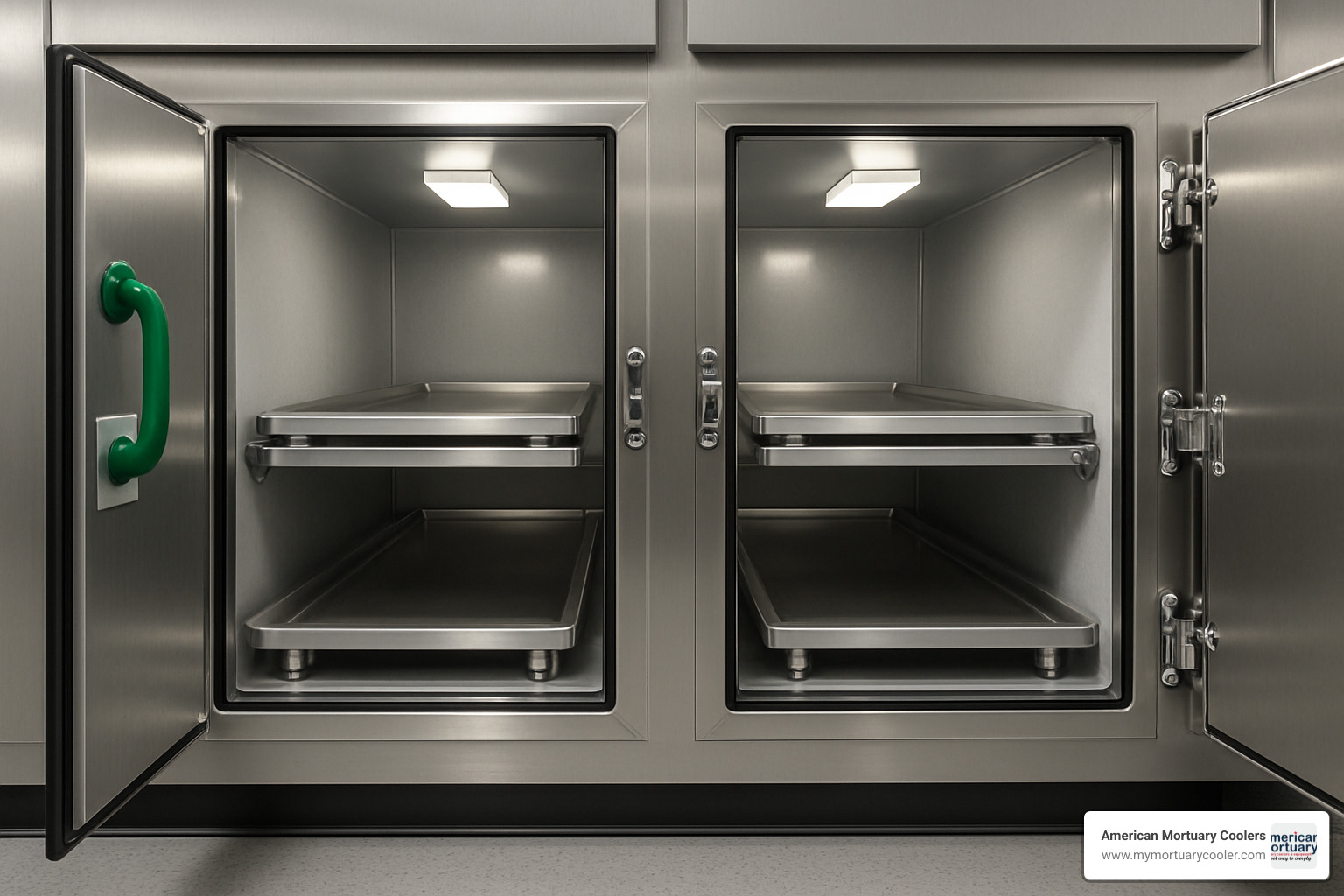
Quality magnetic door gaskets create tight seals while allowing easy access, and chrome-plated hardware resists corrosion in the humid environment. Interior lighting, often overlooked but critically important, provides clear visibility for body identification and retrieval, reducing the potential for errors.
These certifications aren't just bureaucratic checkboxes—they're often required by licensing agencies and insurance providers, and they demonstrate your commitment to providing the highest standard of care.
At American Mortuary Coolers, we believe that those who have passed deserve the same level of respect and care as the living. That's why every morgue refrigeration solution we build incorporates these essential design elements, creating systems that preserve dignity through thoughtful engineering and quality construction.
Portable vs Permanent: Choosing the Right morgue-refrigeration-solution
Deciding between portable and permanent morgue refrigeration solutions is a bit like choosing between renting and buying a home—each has distinct advantages depending on your situation. Let's explore what makes each option valuable:
| Feature | Portable Systems | Permanent Installations |
|---|---|---|
| Setup Time | Minutes to hours | Days to weeks |
| Capacity | 1-48 bodies typically | 2-100+ bodies |
| Lifespan | 5-10 years | 15-25+ years |
| Initial Cost | Lower ($5,000-$30,000) | Higher ($15,000-$100,000+) |
| Operating Cost | Often higher per body | Lower per body |
| Flexibility | Can be relocated as needed | Fixed location |
| Surge Capability | Easily scaled up | Limited to installed capacity |
"Portable units can be your best friend in emergencies or limited-space scenarios," explains our specialist from American Mortuary Coolers. "Meanwhile, choosing permanent units is like planting a reliable old oak tree in your facility—they'll serve you steadfastly for decades."
Emergency & Surge Scenarios
The COVID-19 pandemic taught us all some hard lessons about preparation. Many facilities that never imagined needing extra capacity suddenly found themselves scrambling for solutions. This is where portable morgue refrigeration solutions truly shine.
The MERC System® has become something of a hero in emergency response. This innovative direct-contact liquid cooling system supports up to 48 bodies per deployment and—perhaps most impressively—becomes fully operational in under 15 minutes. When time is critical, this can make all the difference.
For larger-scale needs, modified refrigerated shipping containers offer substantial capacity during mass casualty events. These overflow containers can be delivered to parking lots or other accessible areas when facility space is limited.
"I remember delivering our rapid-deploy coolers to hospitals during the height of the pandemic," shares one of our logistics coordinators. "The relief on the faces of the staff was palpable—they went from overwhelming concern to having a working solution within hours."
Our collapsible body rack systems have also proven invaluable, allowing efficient use of temporary refrigerated spaces when every square foot matters. These racks can transform a standard refrigerated trailer into an organized, dignified storage solution.
Long-Term Facility Planning
For established facilities looking toward the future, permanent morgue refrigeration solutions offer compelling advantages that extend beyond the higher initial price tag.
While the upfront investment is greater, the cost per year over a permanent unit's lifespan typically works out lower—much like owning versus renting property. Our permanent installations often serve facilities faithfully for 15-25+ years with proper maintenance.
Modular expansion capabilities represent another significant advantage. Many of our systems can grow alongside your facility, allowing you to add capacity without replacing your entire system. This "future-proofing" has saved our clients considerable money over time.
"We installed our walk-in cooler from American Mortuary Coolers twelve years ago," shares a funeral director from Tennessee. "When we needed to expand last year, they were able to add two more compartments to our existing system instead of starting from scratch. The seamless integration saved us thousands."
The lifecycle support available for permanent installations provides peace of mind that's hard to quantify. Established manufacturers like us maintain parts inventories and service capabilities for decades, ensuring your investment remains serviceable throughout its lifespan.
Integration with facility systems represents another advantage of permanent solutions. These installations can share backup power systems and connect to building automation for monitoring—creating operational efficiencies that portable units simply can't match.
"We recommend that facilities plan for both their current needs and projected growth over the next decade," advises our Midwest Region representative. "The modular nature of many of our systems allows for cost-effective expansion when needed."
For a comprehensive comparison of all available refrigeration options, see our Ultimate Guide to Refrigerated Morgue Options.
Walk-In & Modular Coolers for Space Optimization
Walk-in coolers represent the most versatile morgue refrigeration solution for medium to large facilities. These systems can be configured to maximize both capacity and workflow efficiency:
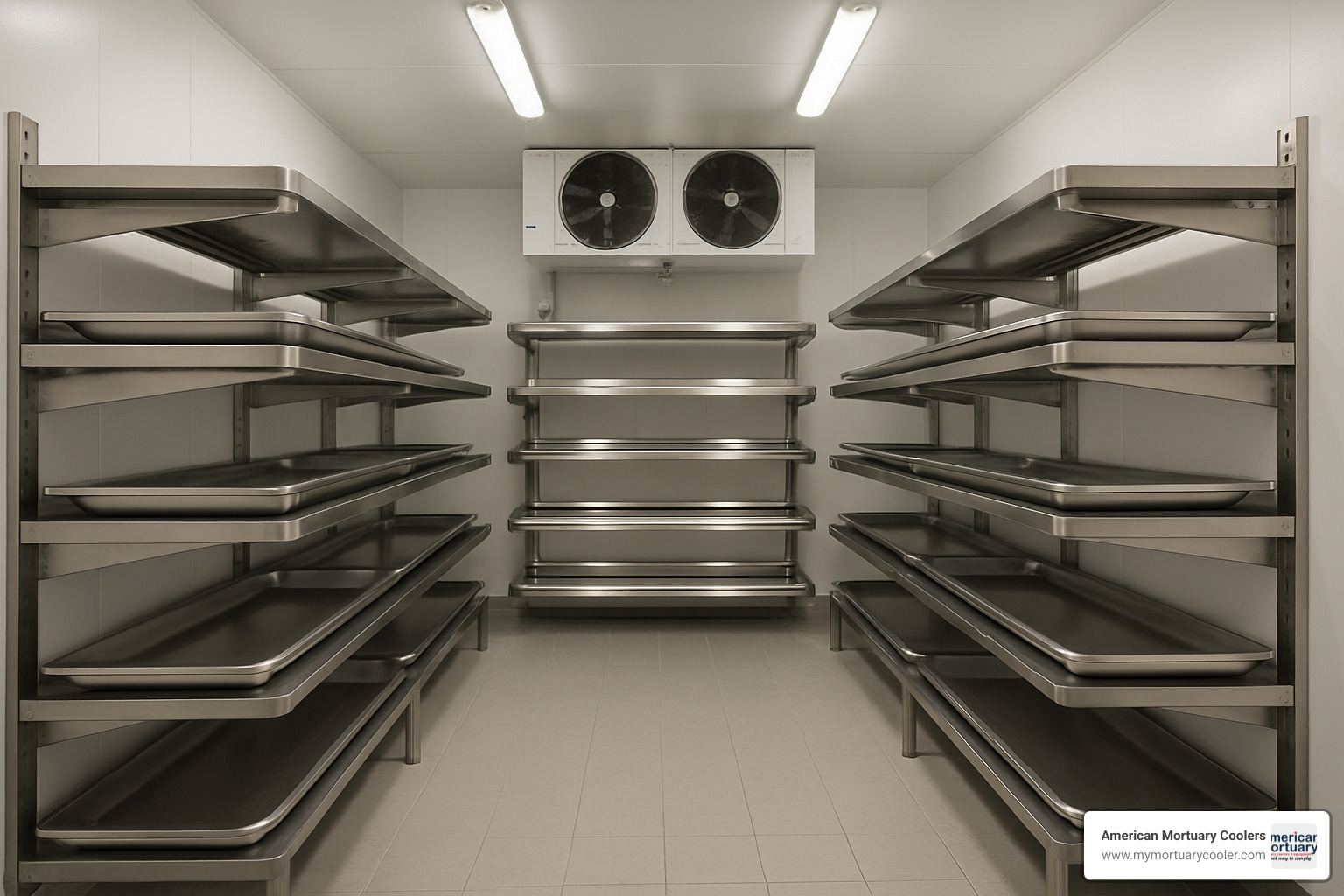
Rack Systems and Capacity
When I visit facilities to discuss their morgue refrigeration solutions, I'm often asked about maximizing space. Modern walk-in systems offer remarkable flexibility through various storage options.
Cantilever rack systems have become increasingly popular because they're adjustable and can be reconfigured as your needs evolve. One county medical examiner we worked with increased their capacity by 40% within the same footprint after switching to this system.
For facilities with more predictable needs, fixed mortuary rack systems provide reliable storage for anywhere from 5 to 50 bodies. These systems are rock-solid and built to last for decades of daily use.
Many of our clients are surprised by how much vertical space goes unused in traditional setups. That's why we recommend stacking tiers that make the most of your ceiling height. As I often tell clients, "It's about maximizing cubic footage, not just square footage."
For staff who handle multiple cases daily, sliding tray systems are a game-changer. They provide easy access to specific remains without disturbing others, reducing physical strain and improving workflow dignity.
Benefits for Morgues & Funeral Homes
"I never realized how much time we were wasting until we switched to a walk-in system," a funeral director from Los Angeles told me recently. "What used to require three staff members now needs only one."
This efficiency boost is one of the main advantages of walk-in morgue refrigeration solutions. Staff can enter the cooler to select specific remains rather than removing multiple bodies to access one—a common frustration with traditional body boxes.
The ergonomic improvements are substantial too. Properly designed rack systems reduce lifting and bending, protecting your staff from potential injuries and making their daily work less physically demanding.
I've worked with many growing facilities who initially hesitated about the investment. Years later, they're grateful for the future growth accommodation that modular systems provide. When their caseload increased, we were able to expand their existing system rather than starting from scratch.
There's also an unexpected bonus: energy efficiency. Larger coolers typically have better surface-area-to-volume ratios, reducing heat gain per cubic foot. This means lower utility bills compared to multiple smaller units with the same total capacity.
For more insights on these systems, check out our article on Chilling Facts About Mortuary Walk-In Coolers.
Customization Options
At American Mortuary Coolers, we've learned that no two facilities have identical needs. That's why customization is at the heart of what we do.
Bariatric bays have become increasingly important in recent years. These wider compartments with reinforced trays accommodate larger individuals with dignity and without putting strain on your equipment or staff.
Some of our most popular installations feature pass-through designs with doors on opposite sides. This smart layout allows bodies to be placed from one room and retrieved from another, creating a natural workflow that separates intake from preparation areas.
For facilities with varying needs, we often recommend combination roll-in/end-opening units. These flexible systems provide options for different types of storage depending on your current caseload.
Even the aesthetics matter in this industry. While standard stainless steel remains popular, we offer custom finish options that can match your facility's décor. For one funeral home in the Northeast, we created a subtly colored exterior that complemented their historical building's interior while maintaining all the functional benefits inside.
Specialized lighting options, including motion-activated systems, reduce energy usage while ensuring staff always have proper illumination when working in the cooler.
"We've created systems with specialized compartments for infectious remains, oversized bays for bariatric cases, and unique workflow configurations for teaching hospitals," explains our design consultant. "The beauty of custom work is that it solves problems you might not even realize you had."
Energy Efficiency & Environmental Responsibility
Today's morgue-refrigeration-solution designs aren't just about keeping things cold—they're about doing it responsibly. At American Mortuary Coolers, we've watched the industry transform as more facilities prioritize both their environmental footprint and their bottom line.
Eco-Friendly Refrigerants
Remember when no one thought twice about what was actually cooling their systems? Those days are gone. The refrigeration world is moving toward greener alternatives that won't harm our planet:
R290 (propane) has become our go-to refrigerant for many new installations. It's completely natural with zero ozone-depletion potential and barely any global-warming impact. One funeral director in Oregon told us, "I sleep better at night knowing our system isn't contributing to climate change."
CO₂ systems offer another excellent alternative. Using carbon dioxide as a refrigerant provides outstanding cooling performance while being environmentally friendly. These systems work particularly well in larger installations where their efficiency really shines.
R448A and R449A HFO blends have largely replaced the older refrigerants that were harmful to the environment. They offer a significant reduction in global-warming potential while maintaining reliable performance.
"This isn't just about being green for green's sake," explains our technical director. "Regulations are actively phasing out traditional refrigerants, so making the switch now is simply good business planning. Why invest in technology that will be obsolete in a few years?"
Insulation and Design Efficiency
The most efficient cooling system in the world won't help much if your morgue-refrigeration-solution leaks cold air like a sieve. That's why we focus on these fundamentals:
High R-value insulation starts with our standard 4-inch polyurethane panels providing R-25 to R-32 insulation value. This thick barrier keeps the cold in and the heat out, reducing the workload on your cooling system.
Thermal-break door frames might seem like a small detail, but they make a huge difference. By preventing condensation and heat transfer around openings, they maintain the integrity of your cooled space and prevent moisture problems.
LED lighting serves double duty—it reduces heat load inside the cooler (unlike old-style incandescent bulbs that worked against your cooling system) while consuming far less electricity. One customer in Michigan reported a noticeable drop in energy usage after this simple upgrade.
Door closers and gaskets ensure that when someone accesses your cooler, it seals properly afterward. We've all seen that refrigerator at home with the door that doesn't quite close—now imagine that on an industrial scale!
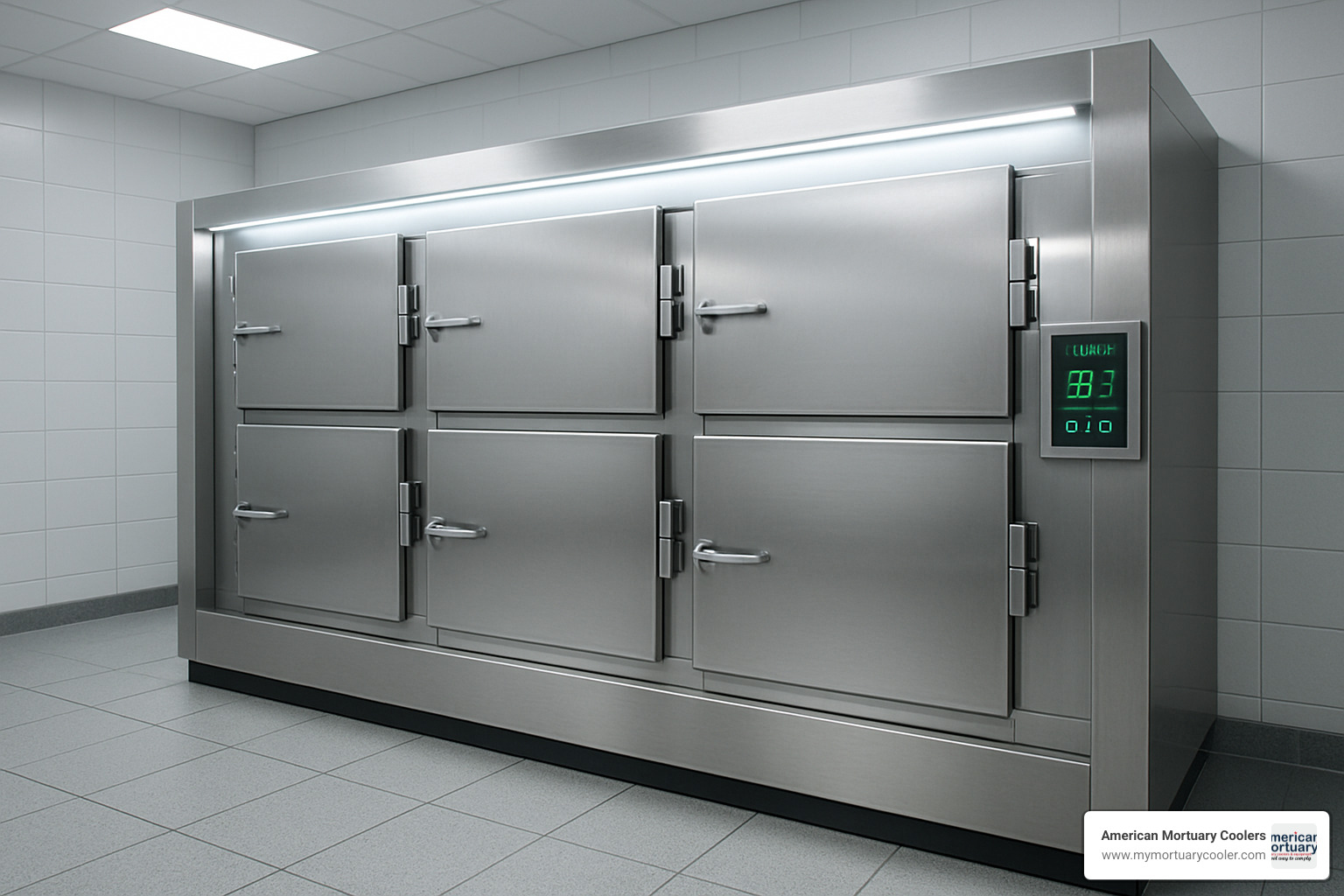
Advanced Cooling Technologies
The brains behind modern morgue-refrigeration-solution systems have gotten remarkably smarter:
Variable-speed compressors have revolutionized efficiency by adjusting cooling output to match actual demand. Rather than the old-school approach of blasting at full power then shutting off (like driving by alternating between flooring the gas and braking), these systems provide just the right amount of cooling continuously.
Demand defrost is another game-changer. Traditional systems defrost on a timer whether needed or not—like showering every six hours regardless of whether you're dirty. Smart systems only defrost when frost actually builds up, saving significant energy.
Electronic expansion valves provide finer control than their mechanical predecessors, much like the difference between a dimmer switch and a simple on/off light switch. This precision means the system works at optimal efficiency more consistently.
Heat-recovery systems capture what would otherwise be wasted heat from refrigeration and repurpose it for water heating or space heating. It's like getting a two-for-one deal on your energy spending.
Reducing Operating Costs
The initial price of a morgue-refrigeration-solution is just one part of the financial picture. Operating costs over its lifetime often exceed the purchase price—which is why efficiency matters so much:
Energy monitoring through digital systems helps identify opportunities for improvement. As one funeral home director in Tennessee told us, "We found our peak usage was happening when we were running other high-draw equipment. Simply staggering those operations cut our bill substantially."
Load management through staggered defrost cycles and intelligent controls prevents those costly peak-demand charges that utilities love to apply to commercial accounts.
Heat reclaim systems can capture waste heat for water heating, reducing overall facility energy usage. A medical examiner's office in Colorado implemented this approach and saw immediate savings on their water-heating costs.
Utility rebates often sweeten the deal for efficiency upgrades. Many energy providers offer incentives that can significantly offset the cost of high-efficiency refrigeration equipment. We've helped numerous customers steer these programs to maximize their savings.
"One funeral home in our Northeast Region reduced their refrigeration energy costs by 37% after upgrading to our high-efficiency system," reports our energy specialist. "The payback period on the additional investment was less than three years. After that, it's just money in their pocket."
For more information on green refrigerants and their impact, check out this scientific research on green refrigerants.
Integration, Maintenance & Compliance
When it comes to morgue refrigeration solutions, the equipment itself is just one piece of the puzzle. To create a truly effective operation, you need to consider how your refrigeration integrates with other equipment, how you'll maintain it for peak performance, and how you'll stay on the right side of regulations.
Integration with Mortuary Equipment
Think of your morgue refrigeration as the hub of a wheel, with spokes connecting to all your other essential equipment. Smart integration creates a seamless workflow that respects the deceased and protects your staff.
"We designed our facility from the ground up with workflow in mind," shares a medical examiner from our Pacific Region. "The seamless integration between our American Mortuary Coolers walk-in and our preparation area has dramatically improved efficiency."
Your morgue refrigeration solution should work hand-in-hand with your autopsy tables, positioning them for efficient transfer that minimizes handling. Body lifts—whether mechanical or hydraulic—reduce staff strain during transfers, an important consideration for both safety and dignity.
Compatible trolleys and carts that match your refrigeration trays create what we call the "single touch" approach—moving remains with minimal transfers. The right shelving systems maximize your capacity while maintaining quick access to any individual. Some of our more tech-forward clients even integrate inventory management software that tracks the location and status of each person in your care.
Maintenance Best Practices
A well-maintained morgue refrigeration solution is like a well-maintained car—it runs better, lasts longer, and costs less in the long run.
Regular coil cleaning prevents the efficiency loss that happens when dust and debris build up on evaporator and condenser coils. This simple maintenance step can reduce energy consumption by up to 25% compared to neglected units.
Door gaskets are the unsung heroes of refrigeration. These rubber seals prevent cold air from escaping, and they wear out over time. A quick monthly inspection can catch worn gaskets before they affect performance.
Temperature calibration ensures your controllers and sensors remain accurate. Even small temperature variations can affect preservation, so we recommend quarterly verification of all temperature monitoring equipment.
"Their preventive maintenance program has kept our system running flawlessly for over a decade," notes one of our long-term customers. At American Mortuary Coolers, we believe in building relationships, not just installing equipment. That's why we provide comprehensive maintenance guidance and service for all our systems.
For more detailed maintenance recommendations, check out our Complete Guide to Comparing Mortuary Refrigeration Systems.
Regulatory Snapshot
Let's be honest—nobody gets excited about regulations. But compliance isn't optional, and understanding the requirements helps you avoid unpleasant surprises.
Many state funeral boards specify minimum refrigeration capacity based on your case volume. CDC guidelines provide specific protocols for handling infectious remains, which became particularly relevant during the COVID-19 pandemic. Technical standards from organizations like ANSI/ASHRAE establish requirements for refrigeration systems that affect installation and operation.
Perhaps most importantly, many jurisdictions require documentation—temperature logs and maintenance records that prove you're maintaining proper conditions. These records aren't just paperwork; they're your protection if questions ever arise about your care.
"Regulatory compliance isn't optional," emphasizes our compliance specialist. "We ensure all our morgue refrigeration solutions meet or exceed applicable standards, and we help our customers understand their documentation requirements."
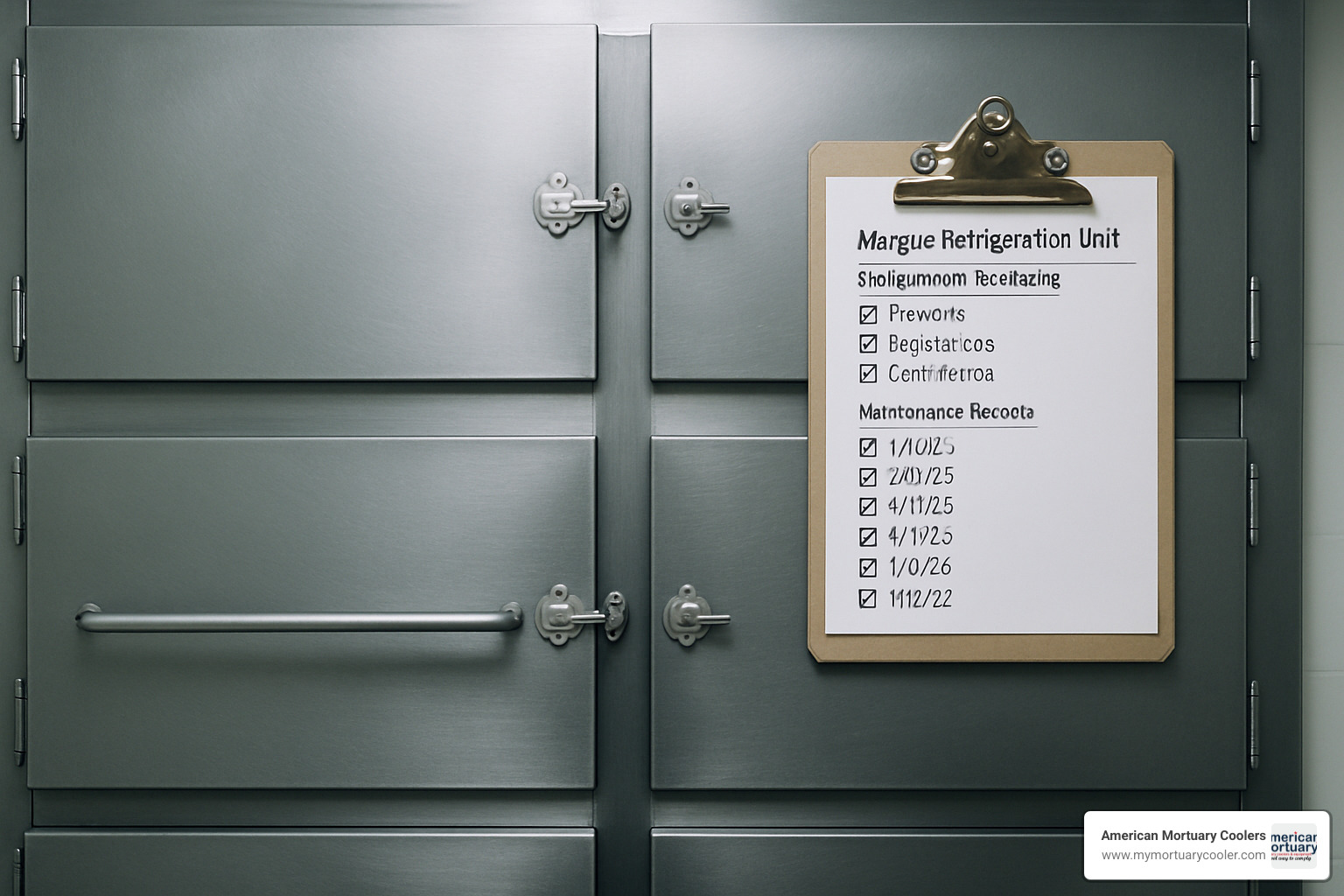
At American Mortuary Coolers, we don't just sell equipment—we partner with you to create an integrated system that works efficiently, stays in top condition, and meets all applicable regulations. Because when you're entrusted with caring for someone's loved one, you deserve equipment that's just as reliable as you are.
Frequently Asked Questions about Morgue Refrigeration Solutions
How long can a body be stored in refrigeration?
When families ask me this question, I always tell them it depends on several factors. In our standard morgue refrigeration solutions (those kept at a cozy 35.6°F-39.2°F or 2°C-4°C), most bodies can be respectfully preserved for about 2-4 weeks.
"I think of refrigeration as pressing the pause button, not the stop button," says Tom, our technical director at American Mortuary Coolers. "We're slowing natural processes, not halting them completely."
The timeline varies quite a bit based on the condition of your loved one when they first enter refrigeration. Someone who passed peacefully at home and was refrigerated quickly may preserve better than someone who experienced trauma or had a delay before cooling.
For those rare situations requiring extended storage—perhaps waiting for family to travel from overseas or during legal investigations—our negative-temperature systems (-10°C to -50°C) can preserve remains for months or even years with minimal changes. These freezer units essentially put preservation on "deep pause."
What factors influence my temperature setpoint?
Choosing the right temperature for your morgue refrigeration solution is like finding the sweet spot on your home thermostat—only with much more precision required!
The main considerations include:
Your intended storage duration makes a big difference. If you're a funeral home expecting quick turnaround for services, standard refrigeration temperatures work perfectly. For medical examiners potentially holding remains for extended periods, colder temperatures become necessary.
The type of preparation you're planning matters too. Some embalmers prefer bodies at slightly warmer temperatures for better fluid distribution, while direct cremation services might keep temperatures at the lower end of the range.
I always remind our customers to check their local regulations, as some state funeral boards specify required temperature ranges. And of course, energy costs play a role—colder temperatures require more electricity.
Most of our funeral home customers find that maintaining their morgue refrigeration solution between 35.6°F and 39.2°F (2°C-4°C) hits the perfect balance between excellent preservation and reasonable operating costs.
Do portable units meet the same safety standards?
"Just because it's portable doesn't mean it should cut corners on safety," is something I often tell customers considering our mobile options.
Quality portable morgue refrigeration solutions should absolutely meet the same fundamental standards as permanent installations. At American Mortuary Coolers, we ensure all our units—whether they're being installed in a basement or deployed to a disaster site—meet rigorous safety certifications:
Our materials and construction meet NSF certification standards for sanitation. All electrical components carry UL listing for safety. We include OSHA-compliant features like interior release handles on every unit, portable or permanent. And our temperature control systems maintain stability within ±1°C, regardless of the form factor.
"During the pandemic, we supplied portable units to hospitals that performed just as reliably as permanent installations," shares our quality control manager. "The only difference was how quickly we could get them up and running."
Some of our portable units actually carry additional certifications related to transportation safety and rapid deployment capabilities, making them even more rigorously tested than stationary units.
When it comes to preserving dignity through proper refrigeration, we believe that temporary should never mean substandard. Your loved ones deserve the same level of care, whether in a permanent facility or an emergency situation.
Conclusion & Next Steps
Choosing the right morgue refrigeration solution is one of the most consequential decisions any funeral home, medical examiner's office, or healthcare facility will make. The system you select does far more than just cool—it preserves dignity for those who have passed, provides essential time for families to gather and grieve, ensures you meet all regulatory requirements, and keeps your daily operations running smoothly.
Here at American Mortuary Coolers, we don't just manufacture refrigeration units—we craft preservation solutions custom specifically to your facility's unique needs. Our Tennessee-based team travels across all 48 contiguous states, bringing our expertise directly to your doorstep.
"I think of our work as creating peace of mind, not just selling equipment," our founder often says. "When you have reliable preservation capabilities, you can focus on what truly matters—supporting families during their most difficult moments."
What makes our approach different is our commitment to the complete process:
We begin with a thorough facility assessment, taking the time to understand your space constraints, workflow patterns, and capacity needs. Our design team then creates a custom morgue refrigeration solution that fits your space perfectly—whether that's a compact three-body unit for a small funeral home or an expansive walk-in system for a busy medical examiner's office.
We coordinate delivery and installation with precision, minimizing disruption to your operations. And most importantly, we stand behind our products with comprehensive service and support for years to come.
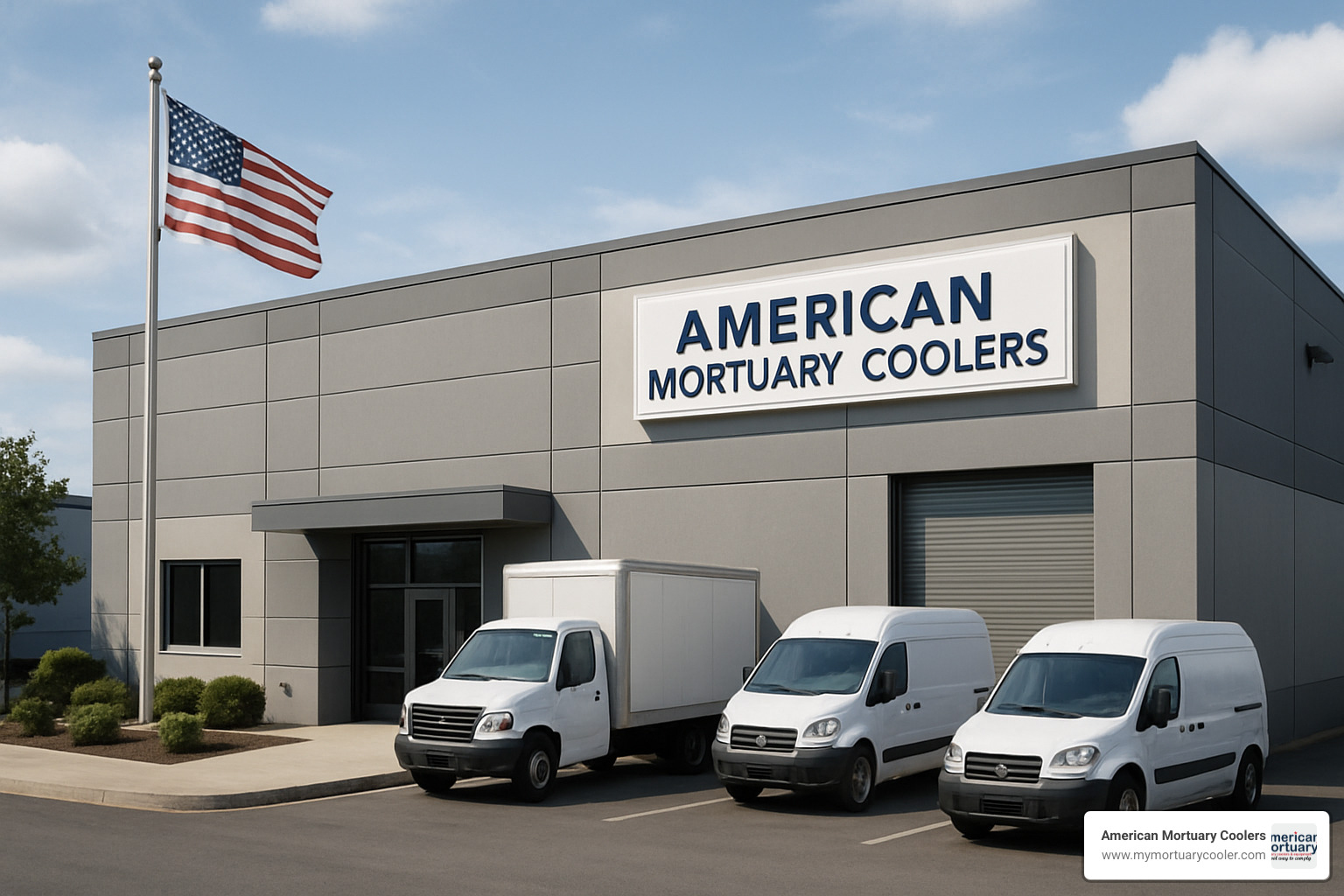
Taking the Next Step
Ready to explore your options? We've made it simple to get started on finding your perfect morgue refrigeration solution. Visit our flagship overview for a comprehensive look at our approach and solutions.
Whether you're planning a brand-new facility, replacing equipment that's seen better days, or preparing for potential surge capacity (a lesson many facilities learned during recent challenging times), our team is here to help you steer the options.
Contact us today for a conversation about your specific needs. We'll listen carefully, ask the right questions, and develop a customized proposal that addresses your unique requirements—not a one-size-fits-all solution.
At American Mortuary Coolers, we understand that behind every morgue refrigeration solution are real people—both the dedicated professionals who serve families and those who have lost loved ones. It's this human understanding that drives our commitment to excellence in everything we build.


















